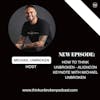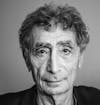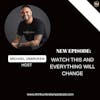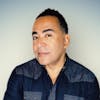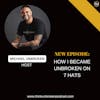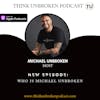How To Manifest Success In Your Life | with Ben Spangl
In this empowering episode of the Think Unbroken Podcast, we are joined by the inspiring guest speaker, Ben Spangl... See show notes at: https://www.thinkunbrokenpodcast.com/how-to-manifest-success-in-your-life-with-ben-spangl/#show-notes
In this empowering episode of the Think Unbroken Podcast, we are joined by the inspiring guest speaker, Ben Spangl, as he shares his journey of overcoming adversity and manifesting success in life. Join us for an emotional and transformative discussion as we delve into coping with parental alcoholism and its profound impact on personal growth.
If you're ready to unlock the secrets of manifesting success while overcoming the challenges of parental alcoholism, join us for this profound conversation with Ben Spangl. Don't miss this transformative episode!
************* LINKS & RESOURCES *************
Learn how to heal and overcome childhood trauma, narcissistic abuse, ptsd, cptsd, higher ACE scores, anxiety, depression, and mental health issues and illness. Learn tools that therapists, trauma coaches, mindset leaders, neuroscientists, and researchers use to help people heal and recover from mental health problems. Discover real and practical advice and guidance for how to understand and overcome childhood trauma, abuse, and narc abuse mental trauma. Heal your body and mind, stop limiting beliefs, end self-sabotage, and become the HERO of your own story.
Join our FREE COMMUNITY as a member of the Unbroken Nation: https://www.thinkunbrokenacademy.com/share/AEGok414shubQSzq?utm_source=manual
Download the first three chapters of the Award-Winning Book Think Unbroken: Understanding and Overcoming Childhood Trauma: https://book.thinkunbroken.com/
Join the Think Unbroken Trauma Transformation Course: https://coaching.thinkunbroken.com/
@Michael Unbroken: https://www.instagram.com/michaelunbroken/
Follow us on TikTok: https://www.tiktok.com/@michaelunbroken
Learn more at https://www.thinkunbrokenpodcast.com
Learn more about Ben Spangl at: https://www.benspangl.com/
Our Sponsors:
* Check out HelloFresh and use my code 50UNBROKEN for a great deal: http://hellofresh.com
Support this podcast at — https://redcircle.com/think-unbroken-with-michael-unbroken-childhood-trauma-cptsd-and/exclusive-content
Advertising Inquiries: https://redcircle.com/brands
Privacy & Opt-Out: https://redcircle.com/privacy
Support the Podcast: Become a listed sponsor!
Follow me on Instagram @MichaelUnbroken
Learn more about coaching at https://coaching.thinkunbroken.com
Get your FREE copy of my #1 Best-Selling Book Think Unbroken: https://book.thinkunbroken.com/
Michael: Hey, what's up Unbroken Nation? Hope that you're doing well wherever you are in the world today. Very excited to be back with you with another episode with my guest, Ben Spangl. What is up my man? How are you today?
Ben Spangl: I'm awesome, man. Thanks for having me. I'm really excited about it.
Michael: Yeah, dear. I'm so stoked to have you here. We got connected through a mutual friend and you know, for me, I think one of the things that's really great about your story and your journey is just you've been able to put yourself in a position to create success in life in a way that a lot of people think and dream about. And I want to probably dive in deep about how we turn those dreams into reality. I think so many people get caught up in their head about things. I can't get focused; I can't seem to figure things out. You know, as well as I do like building any level of success in life takes a tremendous amount of hardship. I know we'll get into that a little bit deeper, but for those who don't know, tell us a little bit about your backstory. What is one thing that I would need to know about your past to know who you are today?
Ben Spangl: Yeah. I grew up in, like functional alcoholic family. So, both mom and dad were big time alcoholics, they both held down good jobs, they had good jobs, but as soon as they got home, they'd started drinking and everything. You know, growing up I didn't think much of it, it was still a loving family, don't get me wrong I didn't think a lot of it. And with my dad though, my dad was very absent, although he was with us, he was with us every night most of the time, he just was not a president guy. I mean, he'd kinda hang out in the basement to himself and everything. And the combination of those things, not having money as a family, and my mom and dad always fighting and struggling, grew me into a very non-confident guy. Got red hair, as you can tell and it was like, I was always picked on as a kid with it, it led to me just not really believing in myself at all. And I remember getting to the point where I got my first job, I had my real first scenario or second interview anyways I think it was my first real career job, I should say. And I was so nervous at this point, I was medicating myself with pot all the time, I was so nervous that I'm in this interview just shaking, shaking. He's asking me those basic interview questions about getting started as a commercial electrician. And you fast forward and I got an opportunity to get into the business world, specifically in financial services, and it led me into a path of personal development. And personal development is what opened the doors, because here I was, no confidence in myself, no belief in myself, didn't really see any real future, you know, as we talk about making dreams happen that wasn't even in my radar. But all those things prepared me to get into personal development that taught me that your past doesn't equal your future and your history is never your destiny. So that was kind of my quick version of how things started change.
Michael: Yeah, that's super powerful, man. And one of the things that I think about, because, you know, I've obviously shared this very publicly, like my mother was a drug addict, alcoholic. My grandmother was an alcoholic. I'd argue many other family members of mine were alcoholics. I've seen that play a role in other families and siblings of mine, I try never to like, go into concise stories about my people, but I'm curious, you know, when I looked at that from being a child, I remember my mother, like blatantly just hiding it like we all knew she was drunk. We all knew like, if she was driving in the car, this might be the last time we are in a car ever. Right. Because we'll probably die. And it's funny because, and I think that it is such a commonality in North America well, really, I guess the world that we have people who are functioning alcoholics. And sometimes that functioning alcoholic is the mom who comes home at 5:00 PM after working all day, having a decent job and gets trashed. When you were growing up, like how were you making meaning of what was happening? Like, were you cognizant of the fact that your parents were alcoholics? Was it something that you guys talked about? Like what role did it play in your childhood?
Ben Spangl: You know, it's funny you ask that at the time I don't think so. And one of the reasons why is that, you know, a lot of their friends that would come over were probably in the exact same situation, right, the people you associate with. So, it was just kind of normal for our family normal. I remember one image that sticks in my mind that I remember a lot is when I was probably 13, I moved down to the basement and then shortly outside of my room is the door to the garage. And when you went out to the garage, there's just cases and cases of empties of the specific kind of beer that my dad drank. So, I mean, I guess it kind of struck me as, you know, he drinks a lot, but I never thought of it as, you know, they've got a problem. And I just didn't know any different, you know, I can remember so many nights, I don't know, nine o'clock at night, 10 o'clock at night, and my mom's hooting and hollering just at the verge of blackout drunk probably is. And how many times I had to walk her from where we were in the sunroom to put her to bed and I don't know, I didn't think much of it at the time, other than this is what it was.
But I'll tell you a story I'm 18 years old and I'm about to go away for college and I had a family member, my aunt, who was like a second mom to my brother and I, and we would spend many weekends at their house and they never had kids, so my brother and I were kind of like their kids and just a blessing in my life. And I'm about to go away for college and she says, can I take you for lunch? And I said, yeah, of course, for sure. And so, we go for lunch and she sits down. We're having a nice chat about, you know, what I'm gonna do on my next steps in life and then she holds my hands across the table of this little diner we're at and she used to call me bins, she goes, bins, I want you to know that the way you grew up is not normal, and that's not how a family's supposed to be, and that's not, you know, and she was talking about, of course, the alcohol and the fighting and the screaming and the abuse and all that stuff. And honestly, it was the first time in my life here, I'm 18 years old, first time in my life that I had even contemplated that that wasn't normal.
Michael: Yeah. I remember once my teacher, Mr. Hollingsworth, he was my English teacher, he is also a wrestling coach for a period of time. I got in a fight at school for like the, I don't know, 50th time probably a hundredth time. I have no idea. And he goes, dude, you're whatever's happening in your home is not normal. You're not supposed to be here. You're not supposed to be in this school. You're not supposed to be in that environment. And I was probably 16, 17, and same thing, it was like the first time I'd ever heard anyone like actually rationalized the fact that this wasn't normal. And I think what's so devastating about it is it does become normal. And I think more so one of the things that really sucks is like, our families often just placate it in a lot of ways. You know, I look at the fact that my aunt, my uncle, they knew other family members like we were being abused, that there were drugs and alcohol in the house, that we were getting evicted, that we couldn't pay rent and it's like no one gave a shit. And I think that part of it is, it's become so normalized for us not to take care of our family, our friends, our ourselves, to be taken care of in childhood. When you look at that, what kind of impact did that have on your relationship with your parents?
Ben Spangl: I was excited to get outta the house. There's no doubt, you know, I was always closer with my mom than I was my dad, and still to this day. I remember being excited to get out on my own and just do my own thing. And it's not, you know, as I say, it's not like I don't think I had a, a bad childhood by any means, there were some challenges, there's no doubt. But they provided for us, they loved us in the best way that they could and what they knew. And I mean, my relationship with my mom, she lives five minutes from us now. It's incredible. She takes care of our kids all the time we're always over, she's always over. My dad and I, I don't know, fairly distant, but there's some kind of relationship there. I don't think of it as a really super close family, I don't know that we were that ever.
Michael: Yeah. One of the questions I always get asked, which I'm actually gonna ask you, I actually get asked this question like, probably almost every time I'm ever a guest on a podcast so, hundreds and hundreds of times. People tend to ask me like, what role did like forgiveness or reconciliation play for you? And so for me, one of the things that I had to do at 18 is I effectively told my mother, I'll never talk to you again. And I carried that through until the day she died. Ben to be honest with you, it's probably singularly one of the reasons I'm here right now. One of the hardest decisions that I've ever had to make and I've always kind of just said, there are things that are unforgivable and there are things that I've forgiven from me. So I'm wondering like, is what is the path of the relationship been for you around forgiveness and reconciliation?
Ben Spangl: Yeah. I was in just about an hour outside of San Francisco. There's a company they don't have this place anymore called Seminars. And they had this retreat that was about an hour outside of San Francisco and they would do these weeklong men's leadership retreats. And it was like the second level of whatever the training was and I'd done a lot of reading in this point in my life. I'd done a lot of journaling at this point in my life, and I thought I had worked through a lot of things and it came to an exercise of something around the subject, forgiveness around family. And I thought that I had worked through what I needed to with my dad and forgiving him for just being absent, for not being there. And then this massive amount of anger and crying and frustration and sadness came out in this exercise. And I realized that, you know, I'd been hanging onto this, I think I was 27 at the time, and I had achieved an okay amount of success in my life, better than I ever thought I was going to at that point, better than anyone in my family had at that point and I went through this whole week, and at the end of this week, I kind of felt, in a way I kind of felt, I don't know how to say it, but I guess in a way I kind of felt broken down like I didn't know what to do next because my whole model of the world was built around this desire to prove, and a lot of it, to prove Michael was to go back I wanted to prove to my dad that, you know, he should be proud of me. And so here I am, I'm 27, you know, got a decent business, they're in multiple six figures, and almost all of my drive and success had come from wanting to be somebody but secretly under side that was just wanting Dad to tell me, I'm proud of you.
I left that event realizing that I didn't need that anymore that, you know, I forgave him in that moment and realized, you know, he did the very best that he absolutely could have the reason why he was the way he was, cuz of how he was brought up and what happened to him. And I can only imagine how that was like. So, I have a phone call conversation with him, I decided I'm gonna call my dad and let him know that I had been holding onto this, you know, I wanted to forgive him and I did call him. It was actually a different seminar, but six months later. I called my dad I'm telling him, I said, dad, listen, I just wanna let you know that I was really angry that I felt like you were never proud of me, nothing was ever good enough. And I can't remember if I said, if he didn't love me, I knew he loved me in his way that he could. And I want you to know that I forgive you for all of that and that I would not be where I'm in life today. Had I have not had those experience and had that not happened. He's a pretty quiet guy. And he goes, said, well, no, I always thought you were gonna be successful and all this stuff and it wasn't much on my dad's end, but that moment of forgiveness for myself, it was massive, man. I mean, it was massive. And I had to recreate a whole new me because again, my whole model of the world was get successful, prove, compete, all that stuff where now I got out of, I don't really care I mean, it's not about that. And it helped me shift, and it wasn't instantaneous by any means, but it helped me shift getting more into creation rather than competition and this need to prove.
Michael: Yeah, it was incredible. I do the same thing where I'm like, there's something powerful in that, right? But I think one of the hard parts when you talk about identity shifts is especially when you've tied so much of yourself into this concept or idea of like, I'm going to prove it until they give me what I think they are going to give me. I find more often than not set you up for massive failure. And I think a big part of that is because we seek whatever that thing might be that we believe is going to be the outcome of getting that moment where I'm just sitting next to this person and I'm like, don't you see I did all this? Can I not have this thing that I want from you? And then you find out, actually no, you can't. And in fact, more often not, you're probably not going to. I sit with a lot of my clients when I'm coaching them, whether they be one-on-one or our group coachings or conferences or whatever and I always try to tell people, I hate to be the bearer bad news, but you're probably not gonna get that thing from that person that you so desperately are holding onto. We chase it because we're like, if I do this, you'll love me. If I do this, you'll be proud of me. If I do this, you'll see me. And especially coming from alcoholic, being a child of an alcoholic is one of the hardest things that I think people go through because I don't know if this was your experience as I watched my mother choose drugs and alcohol, my stepfather chooses the same, my grandmother chooses the same again and again and again. You mentioned something that I think is really worth diving into where it's like, this worth issue pops up and now suddenly you're looking at your life through this scope of I clearly am unlovable because they keep choosing this poison over me. When you were young and you were in this place and you're trying to navigate confidence, lack thereof, love, self-love, self-esteem, like what was going through your head, like where were you with those things and how is it different today?
Ben Spangl: I think back then, I couldn't tell you exactly what was going on through my head, but back then, so much of it was around if I look at my life and what I was doing, it was escaping so, I became consumed by video games, I don't know, 12 years old, 13, whenever I was maybe 10, I don't even know, but just hours and hours and hours. And then as I got older, as a teen, even more so, and then got into online computer games and it really was, it was a way to escape my life. And that's how I spent so much of my time to then, you know, when I became 17, 18, it was a combination of video games and then partying and all these things. Now I look back on 'em, were exactly that, so I'm not sure that I couldn't tell you what was going on in my head, but as I notice it now, I know that's exactly what it was, was I didn't like who I was, I didn't like the way I felt about myself, and I wanted to when I could get into video games, it was like an entirely different world. I could be somebody different. Nobody knew who I was, nobody knew my past, nobody knew any of that stuff, nobody knew the way I felt I could make up a character. So, that's really what I did then, you know, you fast forward today, I mean, life's very different today, of course.
I think all those things though, everything that happened during that time prepared me so much for me being the kind of dad that I wanted to be. You know, learning that, realizing that I've got two daughters, almost seven, almost five, and I spend more time with my kids than most people that I know. And had I have not had all those experiences, my thought process would be very different than what it's, I think I'd still be a good dad, there's no doubt. So, yeah, I mean, back then it was get away from it all whereas now I think even my leisure time today, if I'm not with my family, I'm not business travel, whatever I mean, I just like to learn. I love growing. I love reading. I love connecting with great minds and learning from them. So, it's very different today than it was back then, for sure.
Michael: Yeah. It's funny because I tend to find, having interviewed hundreds and hundreds of people, I've actually lost count, not that we haven't had a tremendous number of great humans, I just don't remember. I find that it either goes one of two ways, there's hardly ever a middle ground when people come from backgrounds like ours. It's either they become what they saw and what they bear witness to as children or the polar opposite. And they become great parents and they become great leaders and great entrepreneurs, business people, whatever. And I see that in my siblings as well, I mean, I would argue my sister and brother who have kids are just phenomenal parents, not that I'm sure they don't have their shit, but we all do their kids. Right. But I see from the outside looking in how they show up and it's really, really powerful. When I reflect on it and I look at the journey, same dude, I just, I fell deeply into video games. Where it was like, this is all consuming in fact, it was so bad where it was at the point where I just didn't do anything else, where there was no, I didn't socialize with people, I didn't go outside, I didn't hang out with my friends, I didn't go to sports practice, I would argue that it's one of the big reasons why I didn't graduate high school because it just felt so much more safe than the real world because I would just sit here and I play like f*cking Diablo two and StarCraft all day. And it was like, man, when I'm here, it's an infinite game. The problem with games like that is there's no end to that so I never had a reason to stop doing it. What would start to happen is people, like my own little brother, I remember one time he was like, we'd take me to this concert. And I was like, no, because I'm playing video games. I don't have a lot of regrets in my life, but I might tack that one close to the board where it's like, I did make up for that. But you know, when I look at that moment, I'm like, man, that was so consuming because even though I had a girlfriend, and even though I played sports, I had no confidence like I was kind of on this autopilot. And then it was like, what effectively happened was I realized like I had to actually go and like be a productive human, because here I was not graduating school. I'm getting out on my own and I have no money and I was like, f*ck. I gotta figure this part out. Right?
And there's a lot of other factors that play a role, but ultimately the thing that shifted my life and transition out of that was just realizing like it didn't serve me. And so, because I know people have, there's so many things we're addicted to right now. And you hear this all the time, and I'm not trying to beat a dead horse, but it is true. Phones, porn, video games, working out, there's just, we need that dopamine hit. I interviewed Dr. Anna Lembke, who wrote Dopamine Nation, which is arguably the greatest book on addiction anyone could ever read. And we all are addicted to something like period. No one's anyone who says they're not f*cking liar. There's somebody listening to us right now, all they do is listen to podcasts. Talking about myself, right? And so, what I'm curious is how did you pull yourself out of that ‘cuz right, there's transitions in life. And obviously that was a while ago, but pulling yourself out of those moments creates precedent. So, a – how did you do it in that moment? And then b – how do you navigate those moments of escapism now when it doesn't benefit you?
Ben Spangl: I think what happened for me was I was there's moments in life that, you know, can really change your life and really start to, and for me it was a subtle one where, well, it was pretty important and intense. But when I was 21, I had moved cities, I had moved from a small town in northern BC, British Columbia where I grew up to Edmonton, Alberta, and I had been working construction, I just ended my only long term relationship, I dunno, 6, 7 months and was at this point where I was no longer playing video games, but I was in this probably the real only time in my life that I would consider myself heavily depressed, where all I did was I went home, or pardon me, I went to work, I went home, I smoked pot, I had dinner, I went to sleep and repeated this whole process, this was my life, for probably about six months. I ended up on a job site and on this job site one of the coworkers to introduced me to a different career path where I got an opportunity to start in business. And in that I got mentors, which really helped me, and they really got me onto personal development. And for the first time in my life, I felt optimistic and I guess the best word is I had possibilities that there could be a greater future and I had dreams of one day being a rockstar. I played drums when I was younger too, and not obsessed with it like I was video games, but played it a little bit.
So I had dreams of being on stages, but back then it was to be a rockstar, to be a metal. But then I realized that as I got into business, I heard all these people talking about that it's not about talent, it's about skill and that you can learn what you need to learn. And I guess being young enough, and I even, I believe that, you know, that was true. I could learn what I needed to learn. And so that was a massive transition. I very rarely from that point onward, very rarely touched video games, I quit smoking pot. I mean, my life changed, changed. Because I had a dream now I had something that was not just, yeah, that'd be nice. It wasn't a lottery mentality. I really had a dream and a vision and it opened up what whole new worlds for me.
Michael: What was it that you saw? Right. And the reason I'm asking this is because I think that a lot of times people are surrounded by others who maybe do have some success or are leading a life, like what they might want. But what is it that you zeroed in on?
Ben Spangl: Yeah. At that point in my life, I mean, it was pretty shallow. It was money. It was what I was interested in money. I watched this guy, there was one of my mentors, great friend of mine today, at the time he was 26, he was making about 420,000 a year, which at that point in my life, he might as well have been making a billion. You know, it was just totally, it was so much money and I thought, man, here's this guy, 26-year-old, I'm 21 what if that could be me? What if half of that could be, what if I could make a hundred thousand dollars? And so, for me it was because one of the other things growing up in my family was money was always an issue, it was always a problem. Mom and dad are always fighting about it. We never had it, you know, we can't afford this, we can't afford that. And one of the decisions I made when I was younger was I don't want that to be me, but fast forward, I'm 21, that's exactly fricking me. You know, I'm working, I'm paycheck to paycheck. Got a job before that where I was making three times the amount of money working bridge construction. I'm still f*cking paycheck to paycheck. So, I didn't know any of the stuff that in our mind, I had no idea on any of that stuff yet. And so for me, I thought, man, if I could make money, then I could be happy. I could have this, I could do, we could travel, we could do all these things. And then that was gonna be, so that's how it started, I wanted to get rich. I wanted to make money. And I realized, you know, within a couple short years that, okay, number one, I wasn't rich. I wasn't making lots of money that first few years, but I realized that there was more to life than just that alone as well. But at the time, that's what it was, that's what drove me, was I thought I want to get residual income. I think my goal was maybe 50,000 a year in residual income and start to have some freedom in my life and to be free to do what I wanna do.
Michael: Yeah. It's so funny, our paths are very similar and at 21, I was like, my goal at 21 is wanna make a hundred grand a year. And I end up making just shy of a million dollars by the time I was 26. But still, like you living paycheck to paycheck, not knowing and understanding money. I interviewed Ken Honda, who's amazing, wrote a book called Happy Money. He's one of the most successful businessmen in all of Japan, he's like, unbelievable. And one of the things that he talks about is very much the same thing you and I experienced, where it's like, how we see money in our childhood is ultimately how we leverage money in adulthood. And I remember being dead, completely f*cking broke, $50,000 in debt and that's when I bought my first personal development course because I was at the point where I was like, whatever. Why not? And then now it's like that feels to me like an anchor. And I don't think money is necessarily a bad thing to move towards because with money comes freedom, comes happiness. Money doesn't make you happy, but it gives you the ability to buy sh*t. It gives you options. It's possibility. I think about this a lot, man. I heard this recently and I wish I could tell you who said this, it might have been on a podcast, I might have been reading a book, it might have been, I don't even know. But I remember saying this thing and it said, the only thing that helps a man who's lost in the desert survive is hope. And I think that there's something about when you said you just felt like there was possibility that it really resonates with me because I'm like, man, I just f*cking believe that somehow, we can do this thing. I don't know what the thing is for you ‘cause it's different for everybody. How important was bearing witness to people doing that thing that you were moving towards?
Ben Spangl: Oh, it was a game changer. I mean, I not had that at the time, I'm not sure that I would've had the faith, the belief, the optimism, and hope.
Michael: What did it do for you?
Ben Spangl: I believed enough that I had watched these people I had heard who they were, where they were, what their story was, power of story. So amazing, right? That it gave me hope. I mean, it really did. I would look at the times that first three years of my business life, I struggled, man, struggled so much and there were days I wanted to quit, days I wanted to give up on it. And I thought to myself of some of these people that I was watching that were mentors of mine that were successful, some from a distance that I read about in books and some people I knew up close and personal. And it reminded me, I reminded myself that men, if okay, if they could do it, then I could do this too. I can change. You don't have to stay where you are. And eventually, if I keep doing the right things, eventually things are gonna work out for me. What's funny is our paths are very similar. So now I'm 24, 3 years of struggle, like worst financial I've ever been in my life, three years of trying to build this business. Right. And then, I end up, I get invited to Harv Becker's Millionaire Mind Intensive seminar, three-day seminar, completely changed my life. My wife and I met at that seminar, so obviously that's a huge thing. But I realized all of a sudden it was like unlocked. I got it. I started to understand programming. I started, well that makes a lot of sense. How can I ever make lots of money when I'm walking around with, on these unworkable beliefs around money rich people being bastards? And if you have money, and I had all these sorts of stuff that I was not aware of.
So, even though here I was three years of working pretty hard, doing what I thought I was supposed to be doing, you know, I'm making the calls, I'm doing appointments, all this stuff, it was a sales business, right? And I'm doing all these things, but I'm struggling. And then as I started to become aware of some of these things, so many things shifted in my life. I started, I wasn't working any harder, but in the next year, my income doubled. And it wasn't massive, man. It went from 30,000 to 60,000. So, at that point in my life, it was frigging massive, you know, the next year making six figures and then multiple, and it changed for me when I started to realize that I mean there was a lot of things that happened growing up, but I developed a very, I don't know, lower middle class money mentality without knowing. And I think a lot of people are living life, money, health I mean, it doesn't matter what area of your life we talk about relationships. We all have these things from childhood. I know you're an expert in this, that have happened, that have shaped us and so much of it's unknowing, so much of it's on this subconscious level. We're not even aware of what's going on. So, I've drifted off your question, but these people that I saw, they gave me hope, they gave me possibilities again, they could do it. Why couldn't I do it? They were not there and now they're here, it's not like they were gifted.
Michael: It resonate. I mean, and that's why I think I know the reason why people come into coaching with me is because I've been where they are. You know? Same reason I have mentors ‘cuz I want to go where they're at, and it's an investment, whether it's time, effort, energy, or money. You and I happen to share a very same mentor, which is a rarity I think in what we do both having completely different trajectories. But you know, the one thing that I've come to discover and it's like, man, if you can just be willing to recognize that the thing that you want is going to take an investment from you, it's incredible what can happen because man, I'll be on calls with people, I'll coach anyone for free at any time. Literally, there's a link on my website. I'll coach 40, 50 people a month for free all the time. Sometimes it's higher, sometimes it's 200 a month. It just depends on the month. And that's on top of running this business and another business and this podcast and all these things ‘cause I just wanna show people possibility. And the one rebuttal that I always get from people, and I'm sure you get this too, cuz you were in sales is they're like, I don't have the money for it. And I'm like, well then, your life will forever be the same because the currency isn't f*cking gummy bears. The currency isn't gummy, the currency is money. That is the exchange of value. And I think that when you're at your lowest and you're most broke that's the time you invest. And I know it seems so stupid, like people are like, that doesn't make sense to me. You mean tell me I shouldn't pay my phone bill this month? Yeah, I do actually. You mean, I mean, you should get the worst car you can afford that you should live with four people in apartment if that's what you need to do, all of these things I have done, by the way. And in fact, been I've nine years ago might've been 10 I post on Facebook. And I share this story frequently because I want people to hear this. I said, can anyone loan me $150 so I can go to therapy this week? I was that broke. But I was like, dude, like what f*ck life do you want to have? And so I'll get on calls with these people and it's like, don't you understand that if you make one decision today that supports your ability to move towards the life that you want, that starts the ball rolling. That's it, man. It's not this other shit. People are like, man, I'm gonna read all these books and go to these seminars. I'm like, yeah, that helps. But it's not the same as when it's the thing that you know you need to do actually doing it. It is the action that changes your life.
But I want to go back into something, I'll circle back to this, but money often becomes a topic of conversation for me in this show. And the reason why is because it is literally the way the world goes around. If it wasn't, I probably wouldn't bring it up that often. I want to stay in this guise of understanding the mindset shift around money. But I also want to talk about, and more importantly, what you saw and witnessed in those people and in yourself about what it meant to not only be a man, but to become a person who, dare I say, like has self-esteem, has confidence, loves themselves and show up. What was it like watching those people and how did that impact you?
Ben Spangl: Yeah, it's a great question. You know, I've never stopped to think about that. I think a mentor as I'm sure you feel the exact same mentors can change your life, you know, because they can provide so much for you. And one of the best things a mentor provides is an example, right? An example of who they were, where they are now. And so for me, I think a lot of it was watching some of these people have, I guess the way that I could walk into a room, there they are, people are surrounded, they're surrounded by people. And to have that confidence and self-esteem, which I did not have at that point in my life, and to see it, it was very attractive because I wasn't sitting at home thinking, man, I hope I stay like this forever. I love being super shy. I love being scared to walk in a room with a, I mean, that was not how I was. I wanted to feel empowered. I wanted to feel that. So, I guess, I think watching it, I'm not sure if it was something that I saw and said, okay, I see what they're doing, so I'm gonna do it as much as it was just a more of a feeling that I wanna be like, that I wanna, you know, be able to walk into a room and handle my own on it. I want people to be able to come up to me and they're excited to talk to me. And so there was those things that I definitely had that hunger for, that desire for that really caused me to do a lot of work. I mean, it caused me to do both the work that my business required, but then the inner work as well. And I know you're big on that stuff I'm massive on that. I mean, there's no way I would be anywhere in my life today if I had just done the physical work of what my business required. It's a part of success, there's no doubt, yet I think a lot of people run away from doing the inner work that's required so that we can heal, we can grow, we can expand. And to me those are some of my favorite conversations is that stuff.
Michael: What was the biggest transformation you had personally?
Ben Spangl: Biggest transformation was going from a feeling Michael of you know, just kinda like, I suck, my life sucks. I'm a loser type feeling and I can laugh about it now, but it was not, that's how it was. To waking up, being in love with myself, to waking up, being in love with my life. I mean, I really do. I want that for everybody, I run seminars and coaching all that stuff and a lot, one of my taglines is create a life and live a life you love. And that's what I want for people more than anything else, is to wake up and you feel, doesn't mean every waking moment like this, but you love your life. You love who you are. You love what you're doing. You love how you're spending your time. And so if I think my biggest transformation, a hundred percent, it's hard to articulate cuz it's a feeling, not necessarily here I was at. Right. But that's 100%. I could tell you the dollars. I could tell you the never traveling to travel. I mean, sure, those are all great, but it's a feeling.
Michael: So, I think this is the question that has to be asked like, how do you get that feeling?
Ben Spangl: I think it's a process. One of your podcasts I listened to on the plane it was a short one and a great one about patience. And I think it is a process, right, of is that, I mean, it's probably possible that you could go from down here to up here, there probably is a way, I'm not sure how to do that, but it's a process of nonstop, continual growth and improvement. And a lot of the growth is, it's not enough to read a book. I love reading books. I read every day. I love to read books. Reading the book itself doesn't really change your life in any way, shape, or form, sometimes the book may give you a new idea, but then it's our job to go act on that idea. And in the acting on the idea, maybe it's a journaling exercise that could be part of the action to a new business idea comes to whatever. But in the acting of the idea, then I do something, I get a reaction from the environment, my external world, that I realize, wow, that changed. I mean, there's something different in my life now. And that to me, that's the process of growth, learning, applying, seeing what happens. And then, now I have real experience from it, right? Cause I mean, we could get a whole bookshelf out there. We go read all those books, and if we read 'em enough, we could probably recite 'em back and forth of even some of the things in here. But if we're not living that thing, I don't know about it. I mean, I know intellectually about it.
Michael: Yeah. I agree. And I mean, that's the physical bookshelf. The digital bookshelf is a hundred times bigger. You know, I read these books because I'm like, where's the singular thought that I can add into my life today? You know, a lot of people, I always encourage, I mean, I push really hard to take action, uncomfortable action. You know, one of the things I look at my life and to go from dead broke, homeless child, in poverty, massive abuse. I mean, everybody on the who listens a show knows my story to speaking on the biggest stages in the world, being on billboards in Times Square, writing a bestselling book, having one of the top podcasts in the world, it only came from doing sh*t. Like, it did not come from any other aspect.
One of the things people don't really know about me, and I think I maybe have only mentioned it once or twice, is, you know, I began my speaking career doing standup comedy. And I would be like, in these rooms with people and just brutally nervous because I was a shy kid. I'm an introvert. People don't believe this about me. I'm a f*cking introvert. And they're like, but you're on stage all the time, I'm like, yeah, until I'm off. And then leave me alone. And then, that's not true. I'll sit and talk to people all day long. I've proven this many times. And it's like, well, what is my dream? Well, my dream is to impact millions of people. Every single year, not in totality every year so I can reach a billion people. And so that in reaching a billion people on a long enough timeline, I create a movement that makes me obsolete. I cannot do that if I'm only reading books and I'm only journaling, and I'm only meditating, and I'm not doing action and people are so afraid. And I get it, man like I'm scared too. You know, there's a lot of pressure on me sometimes, and I'm just like, it's not that I'm not afraid, but I just believe I have hope. I have hope that I'll see this through. And I remember it doesn't matter like, dude, if I go get on stage tonight and I crash and burn whatever, doesn't matter.
Ben Spangl: Yeah. Life grows on.
Michael: Dude, no one's gonna remember in five minutes. I will. But then I'll learn from it. And most people, when they crash and burn, they get crippled. And I'm just like, if you cannot be crippled long enough to just sit in the discomfort and then pull and extrapolate data from that discomfort, that's growth. That's where it's at. And you're faced with this, what I would call a really interesting dichotomy of creating success, sitting in rooms with incredible people, a room where you even, of course, find your wife and still having to reconcile that, not in the too distant past, this was not you. This is the place where people get trapped the most like, if anything. It's now you've become this new identity of the person that you believe that you're capable of being to this level and then you backtrack.
Ben Spangl: A hundred percent. I think that's part of the patience part of it too is recognizing that we're all humans. And I think sometimes, it's so easy for us to be so self-critical of I should know this, or I already know this and I'm not doing it. Part of the process is growth is exactly what you just said, is that you take steps forward in the doing, in the action. You're gonna have mistakes, you're gonna have setbacks, you're gonna have failures. So it seems like steps backwards, but really they're not, they're learning experiences that are bringing you greater awareness and with greater awareness, you can make greater choices, which brings us new results. Right. And if I could go back too, I mean, you're big on action going and doing it. I am too I mean, there's no way you get, I haven't found a way yet to get where you want to go without doing. Right. I just haven't found that way yet It'd be cool. I haven't found it. But I also am big on. I love meditation. I love journaling. I love the reading. I love the seminar. I mean, all those things contribute because there's a time for those things and then there's a time to implement. We spend way more of our time in implementation and action than we do in the study, but yet if we don't spend the time in doing those other things, I find those other things are part of what has helped me really lead a happy life. It's one thing to be successful in your career, to have money and here, you know, in North America, I mean, that's what we're all about. Big careers and big money, which is great. I think it's awesome. I love it. You know, I'm excited about pursuing the next version of my career. If it came at the expense of my happiness, I wouldn't be though and the first 10 years of my business life, that was hard for me to learn. I didn't really, because nothing was ever good enough, you know, reach one milestone I thought a hundred thousand was one of the first ones too and I got the a hundred thousand. You know what it's like, you get there and say, man, this is awesome for a day. Now what? Now what? And so, to me that that deep inner work alongside us pursuing the vision part of the inner work is figuring out what the hell the vision is. You know, I mean, you know this, you coach people all the time. I do too. And that so many times tell me, what do you really want? And it's hard for them to articulate because it does take time. You have to stop and think and to get a pen and paper out, to get a notebook out, to get a journal out, and to actually really sit down and think, what do I want for my life? If I was relieved of all financial concerns, all time concerns, everything, how would I wanna spend my days? And that's so important to figure out. Now we can start to figure out what do I want to do with my life? Like you're living your life on purpose, you're doing what you feel you're meant to do, that's awesome. Can we imagine if we had more people in the world that were doing what they felt they were meant to do?
Michael: Yeah. Well, most people say, well, I don't know what my purpose is, bro. This ain't my purpose. This is what I choose to do every day. I don't know what my purpose is. And I think people get so caught up in that, ‘cuz if you asked me what my purpose was when I was 12, like, I want to be Jay-Z, that's my purpose or the drummer or the Foo Fighters, that was my purpose. Right. And so like, that's not a thing. And then it's like, okay, well what I think you have to do is like, take purpose out of the equation. And I think a lot of people have had traumatic experiences or come from alcoholic parents or abusive backgrounds, they feel like they're not worthy of something that's actually far more simple than purpose. Fulfillment. And it's like what you just said, that's like ensure people always say, take the money off the equation what would you do? Go do it. I'm like, well, that's not always that fucking simple. But what is that simple is like going, okay, how do you become fulfilled? What does it require? Not what do you want to do? Because that is not the same f*cking thing. What is required of you to go and have fulfillment? Because it might be making massive life shifts, it might be removing people, it might be packing up and moving to another city, spending your last $50 getting on the airplane to do the podcast. I don't know what it is for you, but what I do know is that it is, purpose is this big word that people get trapped in where actually doesn't matter. What matters is fulfillment like how are you spending your time? Are you doing things that you enjoy? Not that you always do ‘cuz trust me, dude, sometimes I'm like, man, I was in 11 cities last month, that was exhausting. I don't really love travel that much last month. I love it again this month and I'm gonna do it. Right. And so it's kind of like, how do you find the fulfillment in the little moments. One of the things, and I wanna ask you this question cuz it struck me the second that we saw each other this afternoon, is I think that you have to be in alignment with your truth, with clarity and acknowledge that what you want is okay. And what you want doesn't have to be what other people tell you it should be, it's the hardest one because people tell you, you suck, you're lazy, you're a loser, you're gonna pay this guy to coach you. Like, what the fuck is wrong with you? You know, you hear these things, but you have a shirt on that I align with tremendously, it says vibe higher. Let's talk about this. Yeah. Because people don't wear shirts like that just to wear them.
Ben Spangl: Yeah. I ran my very first personal development seminar last fall and it was called Master Your Mind and so it was a great seminar. And then I wanted to create, and the next seminar wanted to create, you know, what am I gonna do next? And so it began as a seminar title was what it was Vibe Higher. And they came to me and we created the logo, my wife and I, and everything. But it's evolved so much into that, so much more than that part of me.
To me, I'm big on energy, I'm big on frequency, vibration. I'm big on aligning ourselves with everything you just said, our truth, and also aligning ourselves to our vision of the future and the way that we want to feel. And I really believe that, when we think of how we attract people, places, circumstances, conditions in into our lives is, is in any given moment on a quantum level, it's based on our own energy, it's based on who we're being in that moment, our state of being, right? And we're always emitting a frequency of some kind or a vibration. So, to me, when I think about vibe higher is the more we can raise our energy, the more we can vibrate on a higher level vibe higher. The number one, the better we feel in the moment, first and foremost. And we just get to enjoy this life experience while we're here so much more than when we're vibing on a low level. But number two is this is the path to creating the things you want in your life faster than you could in any other way. So, we get our life by doing, you know, you think in a way cause you to feel and act in certain ways, which produces results in your life, 100%. There's also what you attract into your life too and this can be attracting things that well, you're always gonna attract what you're in harmony with, whatever energy level you're at. But sometimes we're attracting people that cause us to stay stuck, we're attracting the wrong kind of crowd to hang around with, we're attracting maybe, you know, even the wrong opportunity for you or something. But then also when we start to vibe higher, when we start to do these things that raise our energy, which really simply, if I could sum it up, I mean, we could spend days talking about this subject, but the easiest way to tell how am I vibing higher? How am I raising my energy? How do you feel? And if you're feeling better than how you were, I mean, you begun the process of you're vibing higher now. And in doing that, you in that moment, you are drawing things to you. So now when you go and take this action, you use the word being aligned.I love the word aligned. Aligned action I think is amazing because you can get through a lot of things in life just by force. You know, you're in business, you're in sales, and you just say, well, I'm gonna make enough phone calls to do X, X, X. And so, you could call all day, you could do that, and it can work. It's usually not the happiest path to success but you can also take a little bit of time to clarify after you've clarified your vision, after you've taken some time to get clear on who do I want to be? You know, what are some things I'd like to have in my life and do in my life, and all that. And then, you begin to act from that space, now we've got aligned action. So now I'm aligning my future vision of what I want, who I want to be, and I'm combining it with what I'm doing in the moment. I believe that our action is magnified significantly, and then new opportunities show up, even the way that we met kind of before we were starting here, how did we all get connected? I think it was, or how did I meet David? That's what it was. And it's amazing to think about these different opportunities that had, I have missed one of them, or pardon me, had the opportunity of showing up, but I didn't act on that opportunity. That we wouldn't be having this conversation right now. This has just been the last 12 months, let alone if I was to look back all the other ones, right? So yeah, it's all about getting on a different level of frequency. It's all about getting on a higher level of energy. And when I love Joe Dispenza's work so much, and one of my favorite sayings that he says is “When you change your energy, you change your life” and I found that to be true.
Michael: Yeah. and I think that this actually, I didn't set this up maybe I don't know. I think that the only way you change your energy, to change your life is to change the things that you do. Right. Which we can agree on, but we often seek blockages that we don't even recognize or blockages that make us vibrate at a lower frequency and put us in disharmony. Do you know what those things are? Well, we can name a million of them. One of them's probably pot and drugs, alcohol, insects and porn, people, community, how you spend your money. Fucking, it's Amazon Prime Day. The only thing I'm seeing on the internet is what did you buy? You don't need anything. Go buy book maybe, won't you do that? You look at like all these energy transferences that we have, all that are in the quantum field, where it's like all of this isn't actually impacting just this moment, it's impacting 27 years from now. The decision for you to be in that chair we have no idea how that plays out. And people, I love what you said, like the opportunity is presented to you, you had to make the decision. I tell people all the time, it's like, here you are and the universe is laying in front of you everything that you fucking want. But it's not packaged the way that you think it's going to be because the universe is basically telling you you're not ready to have it the way that you want yet. You've gotta go through these paces and learn. You have to grow through this. You have to level up mentally, emotionally, physically, spiritually. And as you do that, one of the things that happens is most people don't take advantage of the moment presented in front of them because it's not the thing that they see in the picture frame. But the truth is the picture doesn't develop for another 15 years, five years, seven years, two years. It's like relationships. You're at a conference, you're at a seminar, you meet this woman. You have no idea that's gonna be your wife. Or maybe you do. No, I don't know. But what I do know is if you're not at the f*cking seminar, that's she's not gonna be your wife. And Alex Hormozi says, probably my favorite things that he's ever said, we we're having dinner a couple of months ago, he lives out here too. And he goes, or we were at top golf, we weren't at dinner, we were at this fucking golfing thing. And he says, “volume beats luck.”
I remember sitting there, I was like, in everything. In everything. It's repetition that changes your life. It's the consecutive days of not drinking. The consecutive days of not smoking pot. The consecutive days of not playing video games all day. That allow you the space to get inside of yourself which is so difficult. Where you're like, this is uncomfortable. Do you know how hard it is to be you sober? You're a monster. And guess what? You learn to tame that monster because as you go through the paces and your frequency changes and you get in alignment and you learn to love yourself, your life becomes that picture of the thing that you've been seeking.
Ben Spangl: Yeah, it's so true. I think it's the combination of the things that they compound. When I stop doing these things, they compound. And then what are the positive additions that I can put into my life? You know, someone maybe they don't read at all. Then they start reading as simple as 10 pages a day the compounding effectiveness, someone that never journals, but they take the time to write down five things they're truly grateful for every morning to start with that, to someone that never takes any time to visualize their future. And it could be as simple as five minutes. I mean, it doesn't need to be complex, but the combination of, what do I want to stop doing? What's getting in my way, what's holding me back? And it's not, I mean, for all of us, you know this and I do, it's not usually a secret. It's not usually a perplexing, oh my, I have no idea. We have absolutely know what it is and usually we pretty clear on one or two or three things that if I started doing these things, my life would get better.
The hard part is that consistency in anything takes a lot of mental effort because it's not how you're wired, it's not the habits you've built, it's not your conditioning. And anytime we're trying to create change in our life, the brain itself doesn't really love change. It loves staying the same. It gets to preserve fuel that way. Right. It doesn't take any real effort to change. So, we're fighting against that kind of evolutionary adaptation. We have great intentions of what we want to do. So, it does take work, it takes effort. I mean, there's no other way to put it than that is that if you wanna change your life, it's going to take, some serious effort. The great thing is you 100% can no matter who they are, what's happened. I mean, we can always start a brand-new direction today. And I think that one thing that's helped me and I'm not like, you know, I mean, you know, this is, well, I do, as I talk about these things, I'm not trying to sit here, I've got this all figured out. I mean, I'm work in progress all the time. Getting better at this stuff, making mistakes, all those things are happening for me all the time. And I caught myself recently thinking about what I was going to do over the next 90 days in my health and fitness, and I had all these great things, I'm gonna do this, you know, do X amount of workouts. So, we'd do all this and then it dawned on me in that moment, I said, those are really good. I mean, that's a good plan. You know, that's a really good plan. It dawned on me, I said, well, what are you gonna do today? Because it's so easy for us to think about what I'm going to do in the future with these great intentions whereas instead, I mean, what, the only thing I have control over is right now anyways.
Michael: Yeah. And that's the most difficult part because it's a lot easier to pick up the joint than it is to go to the gym. And it's a lot easier to play the video game than to watch the YouTube video that's educational. It's a lot easier to wake up and eat McDonald's instead of yogurt and berries. How do I know? Because I've done all of those things.
Ben Spangl: Yeah. Makes me think of I went through this phase in my life and in my business where I was obsessed with John Maxwell. So Good. Read every book at the time he had, and one that sticks out to me is he wrote a book, it's a red book read and kind of white, and it's called Today Matters. And it's just a great book. It's a really great book on that very thing is that what you're just talking about, making it today does matter. And the delusion is, is that in the moment? Well, I'll do it tomorrow, I'll do it Monday. Next month, I'll get serious. Next quarter's gonna be my quarter next year. And it’s not allowing ourselves to realize that it's now, it's today.
Michael: Yeah. The delusion is people need to change their relationship with death, that you do, that you won't be delusional anymore. Look, here's the thing, dude, and I say this all, I'm not f*cking Goggins, I'm not Ed Mylett. I'm not Andy Frisella or these guys who are gonna yell at you and be like, do it today. Like, whatever, man. You're either gonna do it or you're not. And if you don't, you don't get a complaint ‘cause I promise you, and a year, your life will look like it does today. But if you just take one step, that's it, man, just do one f*cking thing. That's it. John Maxwell always says people want to be where I am, they never want to be where I've been. And so much of it is like, just take that first step because I promise you, you take one today, in a year, it's different and that one step might be coming into a coaching program with me or with you or it might be, you know, not playing video games for four hours tonight. Because here's what's crazy, even a step is two hours a night and then one and then 30 minutes and then zero. It's exactly right. It's progress, not perfection. I mean, even when I was 350 pounds, people go, how do you lose the weight? I'm like, it took seven f*cking years, that's how I lost the weight. And so my hope is that people will understand that like the life that you want is on the backside of the choices that you make, the decisions that you make, the actions that you take to show up in and out every single day, knowing that your vibration, your frequency, and who you are is going to create the life that you want to have. This has been an awesome conversation, Ben. Thank you for being here, before I ask you my last question, tell everyone where they can find you and learn more.
Ben Spangl: Yeah. Couple places, benspangl.com. You can find any of our events, any of that kinda stuff is on there. I'm pretty much on most of the social platforms. Instagram is where I'm most active;, it's @benspangl, Facebook, all that but those would be the big ones.
Michael: Yeah. And of course, Unbroken Nation. Go to thinkunbrokenpodcast.com. Look up Ben's episode. We'll have these links and more in the show notes. My last question for you, my friend, what does it mean to you to be unbroken?
Ben Spangl: Yeah. I think for me to be unbroken is to be free. It's to have the freedom to know that I can be who I wanna be, I can do the things I want to do. And in being and doing, I mean, ultimately that's going to create the having. So, to me it's all about having that freedom of truly being who I want to be.
Michael: Yeah. Love that man. Thank you so much for being here.
Unbroken Nation. Thank you for listening. Please make sure you follow, like, subscribe, check me out on Instagram at Michael Unbroken, and of course, check out the Think Unbroken Podcast on Apple Podcasts, Spotify, and YouTube.
And remember, every time you share this conversation, you're helping us in generational trauma, transform trauma to triumph, breakdowns to breakthroughs, and helping other people just like you become the hero of their own story.
And Until Next Time.
My Friends, Be Unbroken.
I'll See Ya.
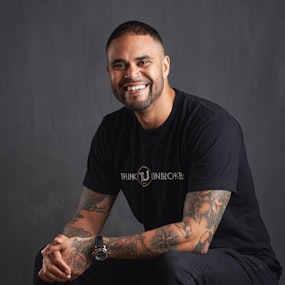
Michael Unbroken
Coach
Michael is an entrepreneur, best-selling author, speaker, coach, and advocate for adult survivors of childhood trauma.
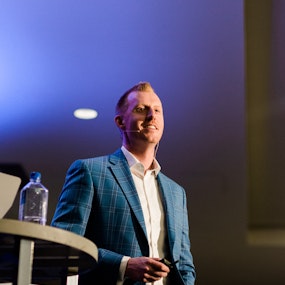
Ben Spangl
Entrepreneur, Speaker, Husband & Father
Ben is an entrepreneur, speaker, seminar leader & host of the top rated podcast, The Pursuit.
He’s a family man, married to his wife Tiffany and raising 2 wonderful daughters.
Ben teaches people all over the world how to create and live a life they love. Helping them understand their mind to get all they desire.
Welcome to The Think Unbroken Podcast!
Here are some of my favorite recent guests!



























